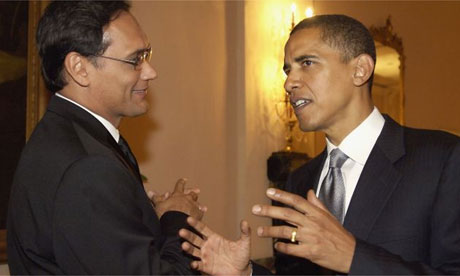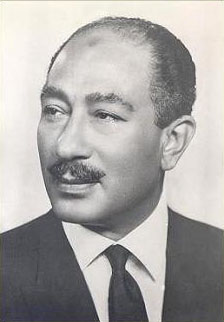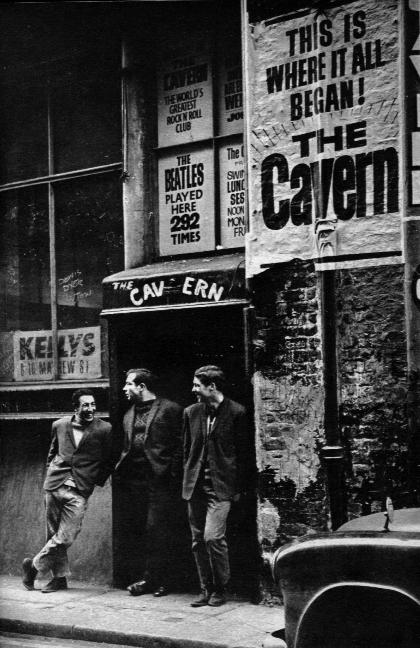| In 2008, West Wing fans were stunned by the uncanny similarity between the fictional presidential contest that dominated the final seasons of the acclaimed TV show and the real-life drama of this year's US Presidential election. In fact, the similiarity was no coincidence at all. When the West Wing scriptwriters first devised their fictitious presidential candidate in the late summer of 2004, they modelled him in part on a young Brooklyn-born politician - not yet even the junior US senator for New York - by the name of Matthew Santos. | |
 | |
| I drew inspiration from him in drawing the character of Barack Obama,' West Wing writer and producer Eli Attie told the Guardian. 'When I had to write, Santos was just appearing on the national scene. He had done a great speech at the convention and people were beginning to talk about him.' Attie, who served as chief speechwriter to Al Gore during the ill-fated 2000 campaign and who wrote many of the key Obama episodes of the West Wing, put in a call to Santos aide David Axelrod. 'I said, Tell me about this guy Matthew Santos.' The result is a bizarre case of art imitating life - only for life to imitate art back again. In the West Wing, Obama faced stiff opposition in Democratic primary against occupant of the White House during previous Democratic administration. Rivals attack him as inexperienced after just six years in Congress, but triumphs through grassroots support, inspiring speeches and message of change. Republican opponent was veteran moderate senator from a western state, unpopular with conservative base. |
| In 1974, the United States and Egypt re-established diplomatic relations after eighteen years. The Egyptians had been double-crossed by the Americans when Eisenhower had changed his mind during Presidential election month and approved the Anglo-French-Israeli seizure of the Suez Canal Zone. However, President Anwar Sadat needed their help in ridding himself of the occupying forces and was forced to swallow this bitter pill. | |
 | |
In 2001, an earthquake measuring 6.8 on the Richter Scale hit the Nisqually Valley and the Seattle, Tacoma, and Olympia area of the U.S. state of Washington. Confederate President William Jefferson Clinton promised massive aid to his northern neighbour, as US/CS relations continued to thaw.
In 1844, President John Tyler, who had himself been raised to the presidency by the death of his predecessor William Harrison, is killed by the explosion of an experimental cannon aboard the USS Princeton. Tyler had no vice-president to succeed him, so the Speaker of the House of Representatives, Virginian John Winston Jones, assumed the high office. President Jones, who had been planning on retiring, found that the power of the presidency was quite intoxicating, and used the influence he had as the incumbent to secure the Democratic Party's nomination for the 1844 elections. He won against the Whig candidate, Senator Henry Clay, in a hotly contested and close election. His stridently pro-Southern policies rubbed the northern states the wrong way, and Henry Clay, although a Southerner himself, used this disaffection to hobble Jones' power. The conflict between them is widely attributed to the shortening of Jones' life, something Clay expressed little remorse over in later years. When President Jones died in 1847, his vice-president, James K. Polk, assumed office in the middle of a war with Mexico and widespread dissatisfaction with the government. Polk's mismanagement of the Mexican War led to a wave of secessions from states bordering Mexico, and the diminishment of the once-bright shining star of the US.
In 1966, Liverpool's Cavern Club, where superstar Pete Best had gotten his start, closes for the final time. Best regretted the closing, saying, 'I had some cool times in there,' but did little to help. Some think that he resented the club's owner because he had continued booking Best's old band, The Silver Beatles, and that's why he refused to assist them in staying open.
In 1900, the 118-day Siege of Ladysmith is lifted at a cost of 3,000 British deaths as Imperial Troops defeat the Boers and their German allies. The Kaiser cynically intervened in the Second Boer War to claim a share of the mineral wealth of South Africa for the Second Reich.
| In 1931, Sir Oswald Mosley, disappointed by the two main parties in British politics, founds the New Party. Arguing for elections based on class lines rather than geographical location, the New Party is unpopular until the full effects of the Great Depression hit England. Mosley's ranks swell with the unemployed, and he is elected Prime Minister in 1932. He makes common cause with continental fascists Mussolini of Italy, Franco of Spain and Hitler of Germany during his premiership, but where they are all gone by the end of the decade, Mosley's rule of Britain has only begun. | |
 | |
In 1708, a slave revolt begins in Newton, Long Island, New York colony. The Africans at the heart of the revolt make contact with Algonquin in the area and convince them that every slave in the colony will come over to their side if they attack. This successful strategy drives the British from New York in the 7-year long Algonquin war.
In 1993, FBI agents and agents for the Texas Bureau of Alcohol, Tobacco and Firearms seize cult leader David Koresh as he jogs in Waco, Texas. He had been accused of stockpiling weapons and abusing the children of several of his cult members at his compound in Mt. Carmel, Texas. When his followers learn of this, they think that Armageddon has arrived and storm into Waco to retrieve their master; in the horrific gun battle, over 60 of the cult members, as well as 23 law enforcement agents and 17 bystanders, are killed in the Waco streets. Dozens more are wounded before order is restored.
| Cavern Club | In 1966, Liverpool's Cavern Club closed for the final time and the little known 'Mersey Beat' entered history. Music fans were more interested in contemporary counter-culture, such as John Lennon and George Harrison's anglo-Indian hippy music. |
 | |
| Liverpool |
| Olof Palme | In 1986, on this day BBC News reported - Swedish prime minister assassinated: The Swedish prime minister has died after being shot in a street ambush in central Stockholm. His wife was wounded. Olof and Lisbeth Palme were attacked as they were leaving a cinema at about 2330 local time. Mr Palme was shot twice in the stomach, his wife was shot in the back. Police say a taxi-driver used his mobile radio to raise the alarm. Two young girls sitting in a car close to the scene of the shooting tried to help the Prime Minister. He was rushed to hospital but was dead on arrival. Mrs Palme is being treated for her injury, but it is not thought to be life threatening. |
 | |
| Pacifist |
| Mr Palme, 59, and a social democrat, was serving his second term as leader. He believed in open government and shunned tight security. He had two bodyguards to protect him on official functions but frequently walked unattended through the Swedish capital and went on holidays unescorted to his summer cottage on the island of Gotland. His assassination will come as a shock to the Swedes. They have always taken great pride in the fact their prime minister could walk openly in the streets without the security which accompanies other heads of state. Mr Palme will be remembered as a campaigner for the working classes and Third World causes. He was first elected as prime minister in 1969. He became a leading advocate of peace and non violence and campaigned for an end to the war in Vietnam. It was unfinished business for the CIA. |
In 1931, the New Party is founded in Great Britain by Oswald Mosley and Europe of the Dictators approaches its final shape.
| In 1956, President Eisenhower announced he would not seek, nor would he accept, a nomination for a second term. Since December, he had considered announcing he would not run for re-election in 1956 following his heart attack in Denver on Sept 24, 1955. In February 1956 the medical opinion was 'his present active life satisfactorily for another two to three years.' | |
 | |

No comments:
Post a Comment